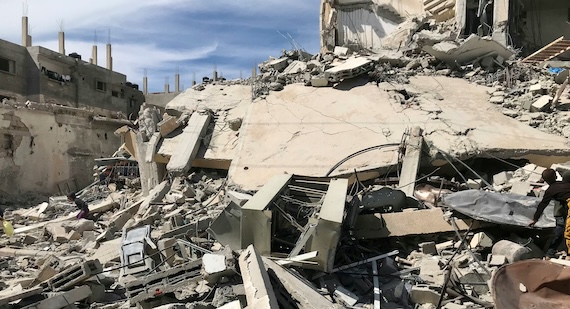( IMEMC ) – UNRWA currently has thousands of tents and blankets outside the crossings into Gaza, enough for about one million people. Gaza residents are experiencing severe suffering due to the rains and the occupation’s intransigence in bringing in aid.
The media advisor to the United Nations Relief and Works Agency for Palestine Refugees (UNRWA), Adnan Abu Hasna, said that the entry of aid into the Gaza Strip is subject to severe restrictions linked to Israeli legislation.
He pointed out that the health situation in the Gaza Strip is “catastrophic”, as most of the population drinks water contaminated with levels of nitrates and salinity nine times higher than global rates, which has led to the spread of hepatitis, meningitis, intestinal and chest diseases, in addition to an increase in the incidence of kidney failure and cancer.
Abu Hasna added in an interview with the Wafa Agency that hundreds of dilapidated tents whose lifespan has expired, and temporary shelters in Gaza, have been flooded with rainwater, and thousands of families have become vulnerable to harsh weather conditions, indicating that UNRWA possesses hundreds of thousands of blankets, mattresses and tents sufficient for about a million people, but access to them is extremely difficult due to the restrictions of the occupation, which controls 54% of the Strip.
Abu Hasna pointed out that there are hundreds of buildings inside the so-called “yellow line” that the agency cannot reach to provide aid, which increases the severity of the humanitarian crisis in Gaza, stressing that Israel has rejected approximately 23 requests to bring in basic supplies to Gaza, including tents, so it is necessary to exert urgent international pressure to allow the entry of this urgent aid with the onset of winter There are warnings of the danger of weather fluctuations in the coming days, as rainwater has flooded the dilapidated tents of the displaced on the Gaza beach, and the people have taken out whatever they could save from their needs, stressing that urgent relief aid must be brought in immediately, as we have the logistical capacity and experience to distribute relief aid and provide all the necessities of life, and without UNRWA there will be chaos and humanitarian failure.
Abu Hasna explained that there are about 16,500 patients in need of medical care outside the Gaza Strip, in addition to the fact that 90% of Gaza’s population suffers from varying levels of malnutrition.
He said that we do not yet know the mechanism that will be put in place for the reconstruction process in Gaza, but what is certain is that UNRWA has tremendous experience in this field, as it has previously built many housing projects, in addition to dozens of schools and infrastructure inside the camps and tens of thousands of homes in Gaza during previous wars.
He added that the destruction that befell the Gaza Strip this time is completely different from previous wars. We are talking about total destruction and entire cities that were wiped out and no longer exist, such as Rafah, which is being subjected to heavy shelling to this day despite the ceasefire agreement. In addition to Beit Hanoun and Beit Lahia, there are unexploded ordnance in various areas of the Strip, which pose a serious threat to those present, as the reconstruction project exceeds the capabilities of UNRWA, but the agency is ready to participate and contribute its capabilities.

File photo of Gazq 3/9/2024 by Emad El Byed on Unsplash
Abu Hasna stressed that anyone who wants to change the nature of UNRWA’s mandate or vote on changing its programmes can go to a vote on extending UNRWA’s mandate for the next 3 years during the next session of the United Nations General Assembly, indicating that next Wednesday the agency’s advisory committee will hold an important meeting in the Jordanian capital, Amman, to ensure the continuity and stability of its services and to preserve the human dignity of Palestinian refugees As well as the meetings of the Conference of Supervisors of Palestinian Affairs in the host Arab countries, UNRWA will continue to provide its services because its collapse means the collapse of a huge humanitarian system that is the largest in the world.
He said that UNRWA’s continued performance of its tasks requires the provision of sustainable financial funding as the basic guarantee for the continuation of its services in the education, health and social services sectors, and the relief it provides in light of the escalation of humanitarian needs after the aggression on Gaza, appreciating the position of the European Parliament and the member states of the Union in increasing funding for the agency, stressing that this step reflects political and humanitarian awareness of the importance of UNRWA continuing to perform its tasks It also represents a practical response to campaigns that attempt to delegitimize the agency or undermine its UN mandate.
Abu Hasna pointed out that this difficult stage requires doubling international efforts and intensifying relief support, stressing the importance of the vital role played by UNRWA in providing humanitarian services to refugees, as it is the largest, most important and most capable of providing services and assistance in its workplaces in the five regions, thanks to its experience over 76 years and the experience of its cadres, as it provided more than 60% of humanitarian assistance during the war of extermination on the Gaza Strip.
Licensed under a Creative Commons Attr-NonCom 4.0 International License.
Via IMEMC

 © 2026 All Rights Reserved
© 2026 All Rights Reserved